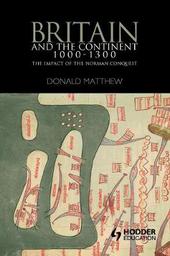
|
Britain and the Continent 1000-1300: The Impact of the Norman Conquest
Paperback / softback
Main Details
| Title |
Britain and the Continent 1000-1300: The Impact of the Norman Conquest
|
| Authors and Contributors |
By (author) Professor Donald Matthew
|
| Physical Properties |
| Format:Paperback / softback | | Pages:336 | | Dimensions(mm): Height 235,Width 154 |
|
| Category/Genre | British and Irish History |
|---|
| ISBN/Barcode |
9780340740613
|
| Classifications | Dewey:941.02 |
|---|
| Audience | | Tertiary Education (US: College) | |
|---|
|
Publishing Details |
| Publisher |
Bloomsbury Publishing PLC
|
| Imprint |
Hodder Arnold
|
| Publication Date |
31 March 2005 |
| Publication Country |
United Kingdom
|
Description
When considering relations between Britain and the Continent, the core issues are commonly those identified by politicians: sovereignty, law, taxation and foreign policy. For others the Continent has other connotations: a source of economic rivalry, an artistic inspiration, a sporting challenge, a holiday destination and even a focus for nationalist xenophobia. However, in the medieval past, there were no British interests at stake because England and Scotland were separate kingdoms and the Welsh had their own agenda. English kings ruled extensive lands on the Continent, so it was hard to know how English interests could be separately identified, let alone voiced. For centuries after the Norman Conquest, the language of public discourse in England was French. The educated elite who attained high office in church and state attended the international universities in Bologna and Paris while the churches of Britain and Ireland willingly took all their problems to Rome for resolution. The papacy provoked no resentment and inspired no heretics. Royal government encouraged participation in the affairs of Europe and placed no obstacles in the way of free access in either direction. Donald Matthew describes these interactions during the period 1000-1300, and cogently assesses what advantage was taken of these opportunities on the broadest possible front.
Author Biography
Donald Matthew is Emeritus Professor of History at the University of Reading
Reviews'A magnificent new survey. Donald Matthew's argument is built up in pointillist fashion. The detail is overwhelming. Most, if not all, is accurately reported, and much of it is drawn from unfamiliar primary sources. The end result is hugely impressive.' * Nicholas Vincent, The International History Review *
|